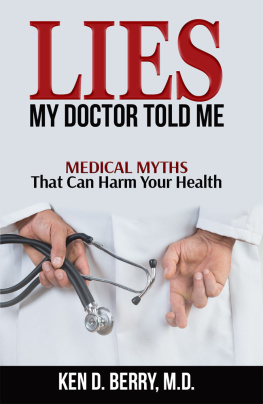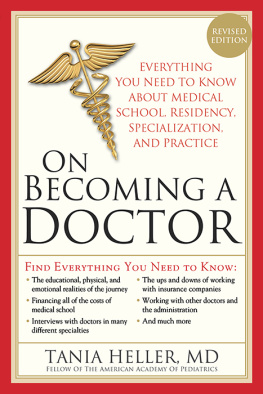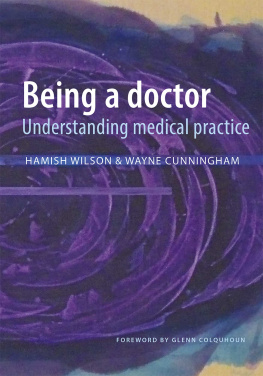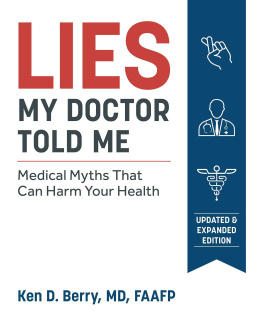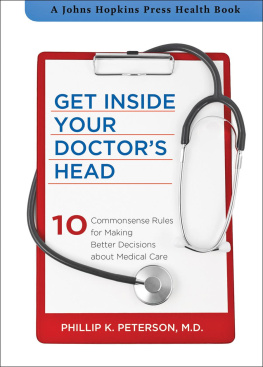Lies My Doctor
Told Me
Lies My Doctor
Told Me
MEDICAL MYTHS THAT CAN
HARM YOUR HEALTH
Ken D. Berry, MD
This book is intended as a reference volume only, not as a medical manual.
The information given here is designed to help you make informed decisions about your health. It is not intended as a substitute for any treatment that may have been prescribed by your doctor. If you suspect that you have a medical problem, we urge you to seek competent medical help.
The author has made every effort to ensure that the accuracy of the information within this book was correct at the time of publication. The author does not assume and hereby disclaims any liability to any party for any loss, damage, or disruption caused by errors or omissions, whether such errors or omissions result from accident, negligence, or any other cause.
Mention of specific companies, organizations, or authorities in this book does not imply endorsement of the author or publisher, nor does mention of specific companies, organizations, or authorities imply that they endorse this book, its author, or the publisher.
Internet addresses given in this book were accurate at the time it went to press.
Copyright 2017 by Ken D. Berry, MD
Published in the United States by Berry Pharmacy, LC
Holiday, Tennessee
All rights reserved. Except as permitted under the United States Copyright Act of 1976, reproduction or utilization of this work in any form or by any electronic, mechanical, or other means, now known or hereafter invented, including xerography, photocopying and recording, and in any information storage and retrieval system, is forbidden without the written permission of Ken D Berry, MD.
Library of Congress Control Number: 2017913437
Berry Clinic, The, Camden, TN
ISBN: 0999090518
ISBN: 9780999090510
Library of Congress Cataloging-in-Publication Data
Names: Berry, Ken D.
Title: Lies My Doctor Told Me: Medical Myths That Can Harm Your Health
To my amazing, beautiful wife Neisha.
And my children, Jonathon, Madison,
Morgan and Abby Grace.
You all are my saving grace,
And my inspiration.
Prologue
The doctor is more to be feared
than the disease.
French proverb
T his book will upset many doctors, it may even upset your doctor. If it does upset your doctor, that is a good sign you either need to work on the relationship between you and your doctor, or find a new one. You see, there are two basic types of doctors. The most common type of doctor is comfortable where he is. He might read a little to keep up his CME (continuing medical education), but have no real interest in reading deeply and broadly about medicine. This doctor readily accepts any new guidelines published by medical societies or the federal government. He doesnt care who paid for the research used to prove that a new pill works. He only wants to practice medicine with as little effort as possible. He considers himself the boss in the doctor-patient relationship. He holds all the knowledge that matters, and the patient should listen respectfully, and not question him.
If a patient suggests to this kind of doctor they try something new or consider a new treatment, he will become flustered, impatient or angry. He doesnt seem to be interested in the uniqueness of each patient. This type of doctor believes he learned all he needed to know in his training, and is not interested in continuing to learn. He will belittle, or berate, a patient who suggests there may be another way to treat something besides the usual way. He is not happy at all if a patient brings information printed from the Internet to discuss with him. He will quickly let the patient know he is the doctor and doesnt have time for such silliness. This kind of doctor will not like this book at all.
There is another type of doctor. This doctor is an eager learner and a lifelong student. He reads far, wide and deep in his own specialty, but also reads about the findings in other specialties. He is always considering new treatments as well as ancient ones. This type of doctor is impressed when a patient is concerned enough to learn about their own symptoms, and bring what they found to their office visit. He feels he is the patients learned partner in their health care, not a dictator. This type of doctor is not offended when a patient speaks of chiropractic, naturopathy or essential oils. When a patient shares a print-out with him, covered in hand-written notes, he is excited, because he knows this patient is very interested in their health. This type of doctor will most likely applaud this book.
This Book is Not Medical Advice
This book is meant to stimulate thought in both doctors and patients. I want you as a patient to re-examine your health and any medical conditions. Are you doing the best you can to optimize your health? Is the advice youve received from doctors the best possible advice? I want you to read, research and think about your health. Stimulating such action is what this book is for. This book is not medical advice. You should not start, stop or change any medication based on what you read in this book. You should discuss such changes with your trusted doctor. If you dont trust your current doctor, then find a new one.
When writing about health and medicine, especially as a doctor, one has to be careful not to give medical advice. This medico-legal term refers to information you should receive only in a doctor-patient relationship, not from a book or website. Medical advice is something that can only be given by a provider to a patient in a particular scenario. This advice is given to the patient either in the hospital, clinic, urgent care or increasingly, during an on-line consultation. You should use the information in this book to become an expert on your health and medical conditions. You should use this book to form intelligent questions and requests for your doctor. You should not, however, change your medical regimen based on the contents of this book alone.
How to Use This Book
You might not want to read this book from cover to cover. It is perfectly fine if you want to skip around, or read only the chapters that apply to your health. Please, underline, high-light and write in this book. Fold down corners, copy and share this book all you want. I want it to help the most people have the best health possible. There is a homework section at the end of each chapter. If a chapter doesnt apply to you, then feel free to ignore the homework. If, however, a chapter seems important to your unique health, then the homework section is where you can continue learning about the subject.
Where are the Works Cited?
The ultimate purpose of this book is to encourage you to do your own thinking. I want you to think about your own health and any diagnoses you might have been given. To take charge of your health, you need to learn how to research health topics on your own. Because of this, and to keep the size of this book under control, I have omitted any footnotes or list of works cited. I am not selling anything, so I have no motive to mislead you. I wont be pushing any supplements, powders or pills on you, I just want you to be awake and aware of your health and the health care offered to you. You can use DuckDuckGo.com, Bing.com or Google.com to search any health topic.
When you are ready to dive deeper into the medical research you can go to PubMed.gov, type in your keywords and search every medical research article in the world. This is the website doctors should use when looking for the latest research on a topic. With your personal internet connection, a cup of coffee and a few hours of research, you can be as knowledgeable as any doctor about your own particular health issues. If you can answer your own medical question then good, if you cannot, then print out what you have researched, along with your notes, and take your research to a trusted doctor. He should be happy to discuss with you the information you have found.
Next page
